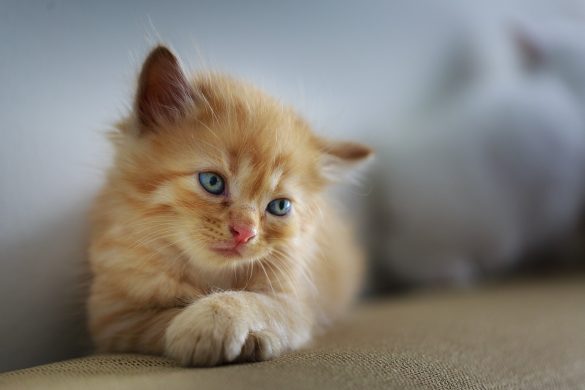Cats are known for their independent nature, but when it comes to food, they can turn into relentless beggars. It’s hard to resist those big, pleading eyes and persistent meows, but giving in to their demands can lead to obesity and other health problems. If you’re tired of your feline friend’s food frenzy, don’t worry – you’re not alone. In this article, we’ll explore some tips and tricks to help you curb your cat’s begging behavior and promote a healthier lifestyle for your furry companion.

1. “Meow-sers, No More! How to Put an End to Your Cat’s Food Frenzy”
Are you tired of your cat constantly meowing and begging for food? It can be frustrating to deal with a feline that seems to have an insatiable appetite. Fortunately, there are several strategies you can use to put an end to your cat’s food frenzy.
First, consider the type of food you are feeding your cat. If you are giving them dry kibble, it may not be satisfying their hunger. Try switching to wet food or adding some moisture to their diet with a gravy or broth. Additionally, make sure you are feeding your cat the appropriate amount for their size and activity level. Overfeeding can lead to obesity and other health problems. Consider consulting with your veterinarian to determine the right portion size for your furry friend. Finally, try feeding your cat smaller, more frequent meals throughout the day instead of one or two large meals. This can help regulate their appetite and prevent them from feeling hungry all the time.
Another strategy to curb your cat’s food frenzy is to provide them with more mental and physical stimulation. Cats are natural hunters and need to engage in activities that mimic this behavior. Consider investing in puzzle feeders or hiding small amounts of food around the house for your cat to find. This will not only provide them with a fun challenge but also help them burn off some energy. Additionally, make sure your cat has plenty of toys and scratching posts to keep them entertained. Boredom can often lead to overeating, so keeping your cat mentally stimulated can help prevent this behavior. By implementing these strategies, you can help your cat feel satisfied and content without constantly begging for food.
2. “From Begging to Behaving: Tips for Curbing Your Feline’s Mealtime Misbehavior”
From Begging to Behaving: Tips for Curbing Your Feline’s Mealtime Misbehavior
Do you find yourself constantly battling with your furry friend at mealtime? Does your cat beg, meow incessantly, or even try to steal food from your plate? These behaviors can be frustrating and disruptive, but there are ways to curb them and create a more peaceful mealtime experience for both you and your feline companion.
- Establish a feeding routine: Cats thrive on routine, so it’s important to establish a consistent feeding schedule. This will help your cat know when to expect food and reduce the likelihood of begging or meowing for food outside of mealtime.
- Use puzzle feeders: Puzzle feeders are a great way to engage your cat’s natural hunting instincts and provide mental stimulation during mealtime. These feeders require your cat to work for their food, which can help reduce begging and other unwanted behaviors.
- Provide plenty of water: Sometimes cats beg for food because they are actually thirsty. Make sure your cat has access to fresh water at all times to prevent dehydration and reduce the urge to beg for food.
By implementing these tips and being consistent with your approach, you can help curb your feline’s mealtime misbehavior and create a more peaceful and enjoyable mealtime experience for both you and your furry friend.
3. “The Purr-fect Solution: Strategies for Taming Your Cat’s Insatiable Appetite
Strategies for Taming Your Cat’s Insatiable Appetite
Does your cat constantly beg for food or act like they are always hungry? Here are some strategies to help manage your cat’s insatiable appetite:
- Portion Control: Measure out your cat’s food and stick to a consistent feeding schedule. This will help prevent overfeeding and keep your cat at a healthy weight.
- Provide Nutritious Food: Choose high-quality cat food that is rich in protein and low in carbohydrates. This will help keep your cat feeling full and satisfied.
- Offer Treats in Moderation: Treats should only make up a small portion of your cat’s diet. Choose healthy options like freeze-dried meat or catnip instead of high-calorie treats.
It’s important to remember that cats are natural grazers and may prefer to eat smaller meals throughout the day. If your cat is still acting hungry after a meal, try dividing their food into smaller portions and feeding them more frequently. Additionally, make sure your cat has access to fresh water at all times.
- Play with Your Cat: Regular playtime can help keep your cat active and burn off excess energy. This can also help reduce their appetite and prevent boredom-related eating.
- Consult with Your Vet: If your cat’s insatiable appetite is causing weight gain or other health issues, talk to your vet. They may recommend a special diet or medication to help manage your cat’s hunger.
By following these strategies, you can help manage your cat’s insatiable appetite and keep them healthy and happy.
In conclusion, curbing your cat’s begging behavior may seem like a daunting task, but with patience and persistence, it can be achieved. By implementing the tips mentioned in this article, you can help your feline friend develop healthier eating habits and reduce the risk of obesity and other health issues. Remember, it’s important to provide your cat with a balanced diet and plenty of love and attention to keep them happy and healthy. With a little effort, you can put an end to the feline food frenzy and enjoy a more peaceful mealtime with your furry companion.

